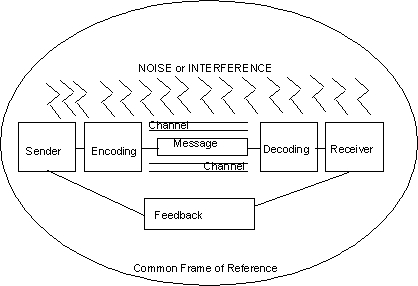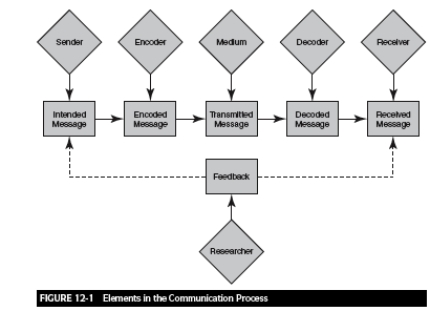Deck 12: Formulating Communications Strategies
Question
Question
Question
Question
Question
Question
Question
Question
Question
Question
Question
Question
Question
Question
Question

Unlock Deck
Sign up to unlock the cards in this deck!
Unlock Deck
Unlock Deck
1/15
Play
Full screen (f)
Deck 12: Formulating Communications Strategies
1
Describe (or draw and describe) the communication process
 .or
.or
.Process involves a message, sender and receiver
.Sender formulates intended message
.Encoder translates it into a message
.Message is transmitted through a chosen medium
.Decoder interprets the message
.Receiver retains memorable parts and associations, and
.Provides "feedback" to the sender
.Extent to which the intended message matches the received message depends on noise, interference, or misunderstandings and shared (or unshared) cultural codes or backgrounds - sometimes called the common frame of reference
2
Describe (or list) the major steps in developing effective communications
. Setting communication objectives
.Generating possible messages
. Overcoming selective attention
. Overcoming perceptual distortion
. Choosing a medium
. Evaluating and selecting messages
.Generating possible messages
. Overcoming selective attention
. Overcoming perceptual distortion
. Choosing a medium
. Evaluating and selecting messages
3
Describe the behavior modification approach identified in the text
.Seeks to modify the consequences of actions using reinforcers as incentives or disincentives (economic - money, raise, bonus or a fine; social - praise, awards, status, prestige, or embarassment; other reinforcers - time (off), food, loud noises, etc.
. Criteria for successful behavior modification:
o desired behavior under the individual's control (able and willing)
o clear link between behavior and reinforcement
o reinforcer is viewed as a reward for the individual
. Criteria for successful behavior modification:
o desired behavior under the individual's control (able and willing)
o clear link between behavior and reinforcement
o reinforcer is viewed as a reward for the individual
4
Describe "shaping"

Unlock Deck
Unlock for access to all 15 flashcards in this deck.
Unlock Deck
k this deck
5
People ignore messages that do not interest them. This is called
A) cognitive dissonance
B) selective attention
C) assimilation/contrast
D) perceptual distortion
E) consequence aversion
A) cognitive dissonance
B) selective attention
C) assimilation/contrast
D) perceptual distortion
E) consequence aversion

Unlock Deck
Unlock for access to all 15 flashcards in this deck.
Unlock Deck
k this deck
6
The part of the communication process which is responsible for miscommunication and misunderstanding is:
A) noise
B) encoding
C) transmitting
D) decoding
E) feedback
A) noise
B) encoding
C) transmitting
D) decoding
E) feedback

Unlock Deck
Unlock for access to all 15 flashcards in this deck.
Unlock Deck
k this deck
7
Messages which discuss a service's price or performance are examples of
A) emotional messages
B) moral messages
C) sensory messages
D) analytic messages
E) rational messages
A) emotional messages
B) moral messages
C) sensory messages
D) analytic messages
E) rational messages

Unlock Deck
Unlock for access to all 15 flashcards in this deck.
Unlock Deck
k this deck
8
People deny messages that counter the order and meaning in their thoughts. This is called:
A) assimilation/contrast theory
B) BCOS theory
C) dissonance theory
D) behavior modification
E) reward/situation framework
A) assimilation/contrast theory
B) BCOS theory
C) dissonance theory
D) behavior modification
E) reward/situation framework

Unlock Deck
Unlock for access to all 15 flashcards in this deck.
Unlock Deck
k this deck
9
To convince a physician to use a particular hospital, the hospital offers physicians special parking places close to the front door. This is
A) adding new positive consequences to change the offer
B) changing importance weights
C) changing beliefs about one or more consequences
D) reducing the consequence barriers
E) changing the latitude of acceptance
A) adding new positive consequences to change the offer
B) changing importance weights
C) changing beliefs about one or more consequences
D) reducing the consequence barriers
E) changing the latitude of acceptance

Unlock Deck
Unlock for access to all 15 flashcards in this deck.
Unlock Deck
k this deck
10
An ad using a jogger who is running along a path suddenly imaging seeing friends and "fans" cheering is using which message execution style:
A) Slice-of-life
B) Lifestyle
C) Fantasy
D) Mood
E) Testimonial
A) Slice-of-life
B) Lifestyle
C) Fantasy
D) Mood
E) Testimonial

Unlock Deck
Unlock for access to all 15 flashcards in this deck.
Unlock Deck
k this deck
11
Message execution includes
A) wording and order
B) style and tone
C) order and format
D) all of the above
E) none of the above
A) wording and order
B) style and tone
C) order and format
D) all of the above
E) none of the above

Unlock Deck
Unlock for access to all 15 flashcards in this deck.
Unlock Deck
k this deck
12
Which is NOT a basic type of headline cited in the text for developing and communicating messages:
A) news
B) mood
C) questions
D) narrative
E) command
A) news
B) mood
C) questions
D) narrative
E) command

Unlock Deck
Unlock for access to all 15 flashcards in this deck.
Unlock Deck
k this deck
13
Johnson & Johnson gave employees sweat suits for attending stress workshops. This is an example of a
A) social reinforcement
B) economic reinforcement
C) constant reinforcement
D) random reinforcement
E) negative reinforcement
A) social reinforcement
B) economic reinforcement
C) constant reinforcement
D) random reinforcement
E) negative reinforcement

Unlock Deck
Unlock for access to all 15 flashcards in this deck.
Unlock Deck
k this deck
14
A smoker starts a schedule of cutting down on smoking by first eliminating the least important smoking occasions. This is called
A) random reinforcement
B) selective attention
C) shaping
D) constant reinforcement
E) negative reinforcement
A) random reinforcement
B) selective attention
C) shaping
D) constant reinforcement
E) negative reinforcement

Unlock Deck
Unlock for access to all 15 flashcards in this deck.
Unlock Deck
k this deck
15
Messages should be evaluated on
A) desirability, exclusiveness and believability
B) words, order and style
C) content, images and mood
D) product, service or behavior
E) shaping, distinctiveness and behavior modification
A) desirability, exclusiveness and believability
B) words, order and style
C) content, images and mood
D) product, service or behavior
E) shaping, distinctiveness and behavior modification

Unlock Deck
Unlock for access to all 15 flashcards in this deck.
Unlock Deck
k this deck



